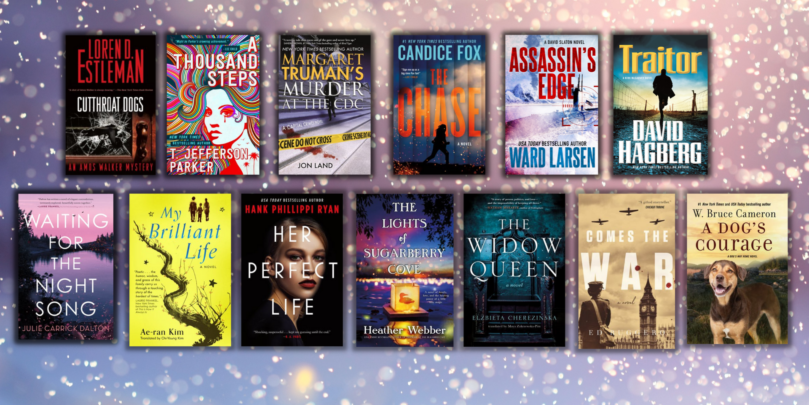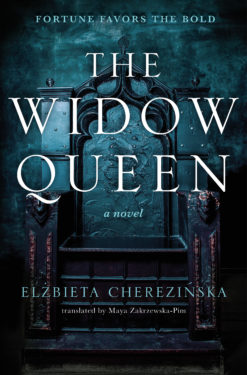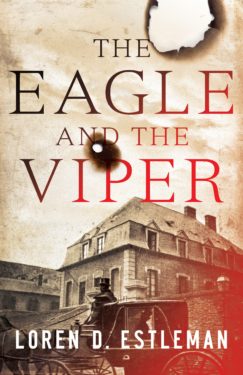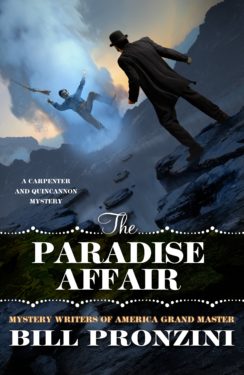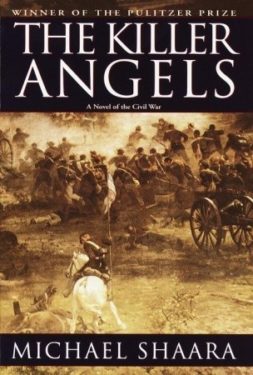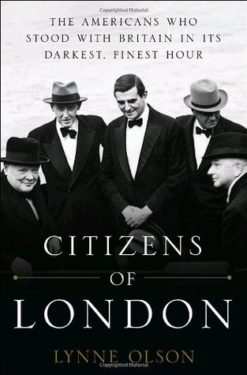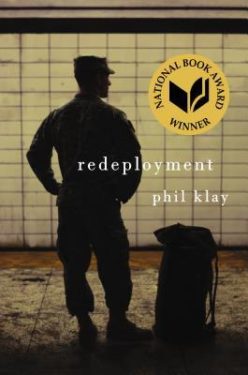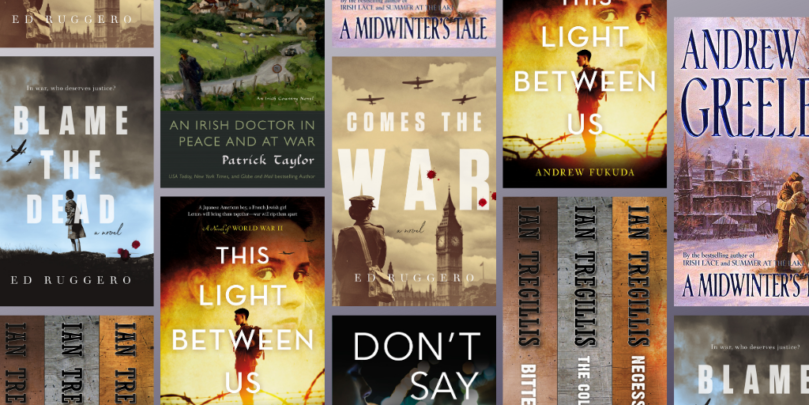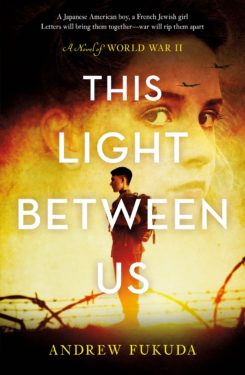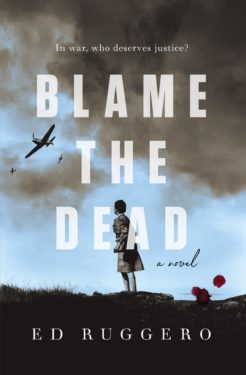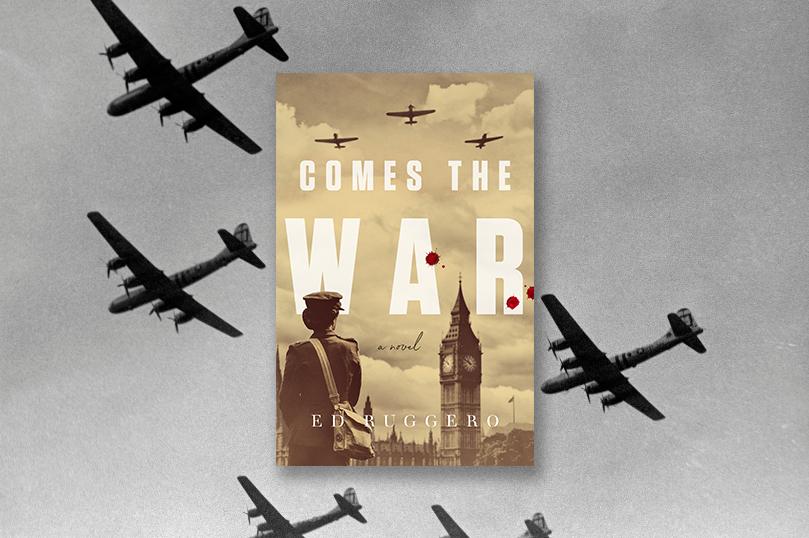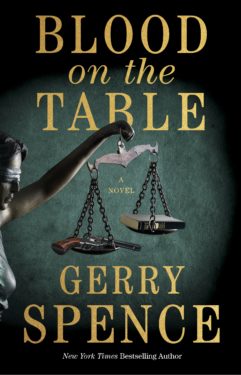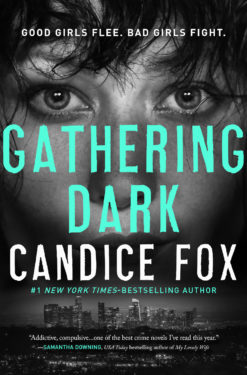opens in a new window
opens in a new window
opens in a new window
opens in a new window
opens in a new window
opens in a new window
Set against the heroism and heartbreak of WW II, former Army officer Ed Ruggero’s opens in a new windowComes the War brilliantly captures the timeless stories of ordinary people swept up in extraordinary times
April 1944, the fifty-fifth month of the war in Europe. The entire island of Britain fairly buzzes with the coiled energy of a million men poised to leap the Channel to France, the first, riskiest step in the Allies’ long slog to the heart of Germany and the end of the war.
Lieutenant Eddie Harkins is tasked to investigate the murder of Helen Batcheller, an OSS analyst. Harkins is assigned a British driver, Private Pamela Lowell, to aid in his investigation. Lowell is smart, brave and resourceful; like Harkins, she is prone to speak her mind even when it doesn’t help her.
Soon a suspect is arrested and Harkins is ordered to stop digging. Suspicious, he continues his investigation only to find himself trapped in a web of Soviet secrets. As bombs fall, Harkins must solve the murder and reveal the spies before it is too late.
opens in a new windowComes the War will be available on February 9, 2021. Please enjoy the following excerpt of the first chapter!
1
20 April 1944
0625 hours
There was a white-helmeted American military policeman at the alley entrance when First Lieutenant Eddie Harkins got out of the staff car. He could see the body about thirty feet in, lying next to some rubbish cans; but there was no crowd, not a single curious onlooker, dead bodies having become all too common in bomb-smashed London. Inside the alley, a man in a dark raincoat squatted near the corpse, while another man stood writing in a pocket notebook.
The MP came to attention when Harkins approached, gave him a snappy salute.
“Who are those guys?” Harkins asked the soldier.
“Brits, sir. Detectives. They said the woman, the victim, is American, so they sent for us. Me and my corporal got here a few minutes ago and they told us to secure the alley. Corporal Quinn is down the other end.” Harkins looked up and down the street, blocks of two-and three-story buildings, the ground floors mostly shops, judging by the signs. Not one with all its windows intact. He wondered where the victim had been coming
from or going to.
“They give you their names?” he asked the MP, nodding at the detectives.
“Yes, sir.”
Harkins looked at the man, who said nothing. “Care to share them with me?”
“Couldn’t understand them, sir. I just can’t get the hang of these accents. Sorry.”
Harkins knew how the kid felt. He’d just spent two days in Scotland, waiting for orders, and he’d heard another GI ask, in all seriousness, what language the locals spoke.
He walked into the alley; the detective with the notebook looked up at him.
“You a copper?”
“Yeah. Eddie Harkins. And you are?”
“Just leaving,” the man said. “This is one of yours, and happy to hand it over.”
Harkins wasn’t sure of the jurisdictional issues, but the detectives seemed to be.
The second detective stood up. He was taller than the first one, face sallow, cheeks sunken, like a man with a wasting disease.
“Pulled this card from her pocket,” the tall man said. “She wasn’t carrying a handbag, or at least we didn’t find one. But she had a wallet, like a bloke’s wallet.”
Harkins took the proffered billfold, an identification booklet inside. Batcheller, Helen. American civilian. The tiny black-and-white photo stapled inside seemed to match the victim, though she looked considerably healthier in the picture. Her occupation was listed as “analyst.” Her employer was the Office of Strategic Services, the OSS, which happened to be Eddie Harkins’ new home in London.
“You a spook, too?” the detective with the notebook asked.
Harkins was looking down at the body, which lay faceup. The woman was missing her right shoe, the left one was worn at the heel.
“What’s that?” Harkins asked, when he noticed the detectives looking at him.
“You with the OSS?” The one with the notebook was talkative, maybe a little pissed off. He wore an old-fashioned fedora, the brim pulled down at a jaunty angle.
“Yeah, but I’m a cop. I mean, I was a cop. Then I was an MP.” “But you’re not an MP now?”
“I don’t know yet,” Harkins said. “I just got here this morning.” “First day on the job?”
“Yep.”
“Aren’t you the lucky bastard.”
Harkins squatted next to the body, examined the wound, one clean slice across the throat. The wide spray pattern of blood on the ground meant the cut most likely sliced both carotids; the killer knew what he—or she—was doing. The victim’s hands and sleeves were bloody; she had probably made a futile attempt to staunch the flow and save herself in the few seconds before she lost consciousness. Probably bled out in a minute or two.
“Any theories about where she was coming from or going to?” Harkins asked as he stood.
The man with the notebook said, “That’s your problem now, mate.” “Don’t be an arse,” the tall one said to his partner. Then, to Harkins,
“It’s just that we’ve had a lot of back-and-forth over jurisdiction with you Yanks. Tommy here is a little bit tired, that’s all.”
The tall man held his hand out, and the one named Tommy handed over his notebook.
“Why don’t you take a walk, Tommy? I’ll catch up in a bit.”
Tommy gave Harkins one more sour look, then walked toward the end of the alley.
“Name’s Hoyle,” the tall detective said, offering his hand. “Detective Sergeant.”
“Harkins.” The men shook.
“The way it started, this was back in ’42, any crime where both the victim and perpetrator were American was handled by your military authorities. If a British civvy was involved, either as victim or perpetrator, we investigated alongside your provost marshal. After a while it got so the American investigators were cutting us out altogether if a Yank was involved. Naturally, some of the fellas resented this. Tommy, for instance.” “I see,” Harkins said. And he did. During his time as a Philadelphia cop he’d seen arguments over jurisdiction break into actual fistfights among detectives.
“Well, this victim is definitely yours, so you’ll take charge of the remains. Tommy and I will do a sweep of the neighborhood, see if we can scare up any witnesses.”
Hoyle wrote something in his notebook, then tore out the page and handed it to Harkins.
“Here’s my number. We’re at the station at Somers Town. Phone me at this number later today, sooner if you find something.”
As Hoyle walked away, Harkins saw the MP at the end of the alley talking to two American officers. A major stepped around the soldier and walked quickly toward Harkins, a captain and a civilian trailing. The civilian was dressed in a rumpled suit and carried a camera. The captain was very tall.
“You Harkins?” the major yelled when he was still twenty feet away. “Yes, sir,” Harkins said, saluting.
“Glad you got my message to get your ass over here. I’m Sinnott; this is Wickman.”
Major Sinnott did not offer his hand. Wickman reached forward as if to shake with Harkins, then thought better of it.
That explained the first part of Harkins’ morning. He had reported to the reception desk inside OSS headquarters on Grosvenor Street, duffel bag on his shoulder and exhausted from an all-night train ride from Scotland, only to have the duty NCO hand him a barely legible note with an address he read as, “Cramer’s Pancreas.”
Fortunately the duty driver, a young British woman in the drab uniform of the Auxiliary Territorial Service, deciphered the note and delivered Harkins to Cromer Street in Saint Pancras.
Sinnott was about five ten, same as Harkins, bigger through the shoulders and chest. His uniform, Harkins noted, looked tailor-made, definitely not from some musty quartermaster’s bin. When he removed his service cap to wipe his brow, Harkins noted the jet-black hair, slicked back like Clark Gable’s. Seemed a little fussy for a crime scene first thing in the morning.
“We have an ID,” Harkins said, stepping away from the body as the photographer went to work documenting the scene. “Name’s Helen Batcheller.”
Sinnott stepped past Harkins and bent over the body, cutting the photographer’s line of sight.
“Christ,” Sinnott said. “That’s a mess right there.”
He stepped away, checked the bottoms of his shoes for blood; Wickman did not approach the corpse.
“Know what the maquis call that?” Sinnott asked. He made a slashing move across his throat with one thumb. “A Gestapo collar. The Krauts use piano-wire garrotes; tighten ’em up real slow to get the poor bastards to talk.”
Harkins wanted to ask what a maquis was, but Sinnott never paused to take a breath. A real talker, this one.
“We’re going to run this investigation,” Sinnott said as he moved farther away from the bloody mess that had been Helen Batcheller. The photographer went back to work.
“What about the provost marshal, sir?” Wickman asked. He was easily six or seven inches over six feet, rail thin with narrow shoulders and long arms. He spoke softly, as if worried about interrupting someone’s nap.
“They’ve got that new branch,” Wickman continued. “Criminal investigators.”
“Criminal Investigation Division,” Harkins said. “CID.”
The new office—only constituted in January—was allegedly staffed by trained investigators and responsible for policing the vast numbers of crimes committed by GIs crammed into Britain.
“To hell with them,” Sinnott said. “We’re going to run our own show, no matter what those CID clowns do. Wild Bill is going to go ape-shit crazy when he hears about this.”
Harkins knew “Wild Bill” was Brigadier General William Donovan, legendary head of the OSS, the Office of Strategic Services, America’s blandly named spy agency.
Harkins had already held a number of jobs in his twenty-seven months in the Army, but he’d never been, never trained as, and certainly had never volunteered to become a spy or a spy-catcher. Yet here he was, and the folded set of orders stashed in his duffel bag clearly directed him to report to OSS, London Base. Major Richard Sinnott was his new boss.
“You’re going to have to survey the area,” Sinnott said to Harkins. “Look for witnesses who saw or heard something.”
The response that popped into Harkins’ mind—because he’d been up for twenty-eight hours—was something like, “No fucking kidding.” But he just nodded.
“I can talk to her coworkers and her boss,” Wickman said. Eager. He leaned forward, and Harkins wondered if he had a hard time hearing people who weren’t also freakishly tall.
“Harkins is going to take the lead on this,” Sinnott said. He watched Harkins’ face, gauging his reaction to this news.
Wickman looked surprised. After a few uncomfortable seconds, he said to Harkins, “Lieutenant, can you give us a moment, please?”
Harkins walked to the end of the alley near where the same patient MP stood. It was full daylight now, and the soldier was stifling a yawn as Harkins approached. As he expected, the brick walls on either side of the alley carried the conversation between Wickman and Sinnott nearly perfectly. You learned some things growing up in a city.
“Sir,” Wickman said, “I’d really like to get a shot at this investigation. Besides, Lieutenant Harkins was supposed to start training right away for his assignment.”
“That was before one of our people wound up in an alley with her throat laid open,” Sinnott responded. “Besides, Harkins has experience investigating murders.”
“I have three years in the Los Angeles Police Department,” Wickman said.
“Gold shield?” Sinnott asked. He didn’t sound curious, more like he already knew the answer.
“No, sir.”
“You drove a desk, right?”
Wickman didn’t answer. Sinnott called, “Harkins, come here.”
As Harkins approached, the camera’s flash turned the lake of Batcheller’s blood from deep crimson to black.
“Sir?”
“You conducted a murder investigation last summer, right? In Sicily.” “Yes, sir. But I’m not a trained investigator.” Harkins almost said, “I wasn’t a detective, either,” but it would have been clear he’d been eaves-dropping.
“I was a beat cop.”
“I heard you have good instincts,” Sinnott continued. “Got that straight from Colonel Wilbur Meigs, who was provost over there for General Patton.”
Harkins remembered Meigs, a World War One vet who’d come back in the service to lead the provost marshal’s efforts to maintain law and order amid the chaos of a combat zone. Back in Sicily, Harkins had spent an unpleasant morning with Meigs pointedly reminding him that supposition, guesswork, and half-baked theories were not the hallmarks of a good investigator.
“He’s the one who recommended you,” Sinnott said. “Recommended me for what, exactly, Major?”
Sinnott smiled at him. Probably, Harkins thought, the same way the Romans smiled at a doomed gladiator.
“Don’t worry about that yet. For now, I want you working on this murder. The CID guys will probably show up at some point, but I want you to keep after it, too. Don’t get in their way, but keep after it.”
The three men looked down at the body. Lying on her back, one arm flung to the side and the other across her stomach, Helen Batcheller, late of the Office of Strategic Services, looked small and lonely. But she wasn’t inconsequential. She was someone’s daughter, maybe a wife, a sister. She was a volunteer, perhaps a critical contributor at OSS, certainly part of the vast footprint of American might come to help save the Old World. And at the end of her too-short life, she was a victim. Now it was up to Harkins to find some justice for her.
Harkins got word that it would be at least an hour before the U.S. Army hospital morgue could send a team for the body. He started pacing the length of alley, looking for clues, pieces of clothing, a handbag, the victim’s missing shoe—anything that might give him some idea of how and why she ended up here.
Sinnott grew bored quickly and left, Wickman and the photographer in tow. The MPs stood at their posts, one at either end of the alley, and after a few minutes the duty driver called out to him.
“May I approach, sir?”
Harkins could not remember her name; she was simply the driver who’d been up next on rotation from the motor pool that supported the American Embassy and OSS staff.
“Sure. Can’t hurt to have another set of eyes help me.”
When the woman drew closer, Harkins saw that she was young, about the same age as his sister Aileen, who would turn twenty-one in September. She wore a loose wool jacket and baggy pants, the bottoms of her trouser legs tucked into canvas leggings. Her face was thin. Like a lot of Brits, she’d probably lost weight since rationing started. Fifty-five months, meat scarce, cheese doled out in tiny bits not much bigger than a sugar cube, endless root vegetables grown in household gardens that might, during peacetime, have been rose beds. The Dig for Victory posters hanging everywhere always showed a colorful bounty that was hard to replicate.
“What’s your name?” Harkins asked.
She gave him a British salute, palm out, snapping her heels together. “Private Lowell, sir.”
Harkins returned the salute, then stuck out his hand. “Harkins.”
She hadn’t anticipated a handshake and fumbled to remove her leather driving gloves, which made Harkins wonder if British officers ever shook hands with troops. Lowell had blue eyes and fair skin, a spray of freckles across her cheeks and nose. What hair Harkins could see peeking out from under her flat cap was curly, strawberry blond. She could pass for his sister.
“We’re going to walk the length of the alley again, see if anything looks out of place, anything doesn’t belong here.”
“Right. Very good, sir.”
The alley was no wider than ten feet, so Harkins and Lowell were practically shoulder-to-shoulder as they walked.
“You know the area around here?” Harkins asked.
“Saint Pancras? Just from driving, sir. I’m from Holloway.”
When they reached the body, Harkins half expected Lowell to look away. Helen Batcheller’s throat was sliced open, neck muscles and tendons gleaming wet in the dull dawn light. Instead, the young woman squatted down, much like Detective Sergeant Hoyle had done. She kept her knees pressed together demurely, though she wore pants.
“What do you see?” Harkins asked.
“Well, she’s missing one shoe,” Lowell said. She looked around. “I don’t suppose you’ve found it.”
“Nope.”
“So maybe she was dragged in here. Bit of a scuffle with the murderer.
Lost her shoe that way.” “Could be,” Harkins said.
“On the other hand, her clothes are blood soaked, but not disheveled.
If there’d been a struggle her blouse would have come untucked.” Harkins squatted next to the body to confirm Lowell’s observations. “You look a little young to have been a cop,” Harkins said, standing
again. “You an aspiring detective?”
“No, sir,” Lowell said, looking up at him. “I just read a lot of Sherlock Holmes when I was young.”
Harkins chuckled, but Lowell didn’t crack a smile. She hadn’t meant it as a joke.
“Yeah, of course,” Harkins said. “You want me to walk the alley?”
“Yes, but if you find anything, don’t touch it, okay?” “Certainly, Lieutenant.”
Lowell stood and walked slowly toward the next street, head down, taking her time.
Harkins walked in the opposite direction. The MP—GIs called them snowdrops because of the white helmets—was asleep on his feet. He flinched when he heard Harkins.
“Sorry, sir.”
“It’s okay. I’m only awake because I’m walking.”
Lowell called when the detail from the hospital showed up to retrieve the body. When they met by the corpse, Harkins asked, “Find the shoe?” “No, sir. Can’t imagine where it could be, unless she came here in a car and left it behind.”
Harkins thought about a guy he’d helped apprehend in Philadelphia, a serial rapist. When they searched his room they found a stash of women’s personal items: shoes, underwear, a few dime-store necklaces. The detective on the case called them trophies, something the bad guy had kept to help him remember—and probably fantasize about—his crimes. Harkins did not share this memory with young Lowell.
There were two GIs with a stretcher, a bored staff sergeant overseeing the detail.
“You seen anybody from CID?” Harkins asked the sergeant. “What’s that?”
“Investigators,” Harkins said. “Like detectives.” “No, sir. Nobody here but us chickens.”
Harkins scanned both ends of the alley, wondered if anyone had notified CID, wondered how Sinnott had learned about the murder seemingly ahead of everyone else.
“Ask a doc to take a look at the victim for me,” Harkins said to the sergeant. He lowered his voice, trying to make it harder for Lowell to hear. “I want to know if she’s been raped, assaulted.”
The sergeant looked at Harkins, then at the body. He walked over to where the stretcher lay on the ground and unceremoniously hiked up Helen Batcheller’s bloody skirt.
“It ain’t brain surgery, Lieutenant. Look, her knickers are intact, still pulled up to her waist.”
Lowell stepped closer, looked at the corpse, then at Harkins. She nodded her head slightly.
Helen Batcheller was beyond caring about her dignity, of course, but the open-air exam bothered Harkins.
“Okay,” he said. He motioned with one hand and the sergeant pulled the skirt back down. One of the GIs produced a wool blanket and covered the body.
After Batcheller had been carried away, Harkins thanked and dismissed the MPs after writing their names in his notebook, then he and Lowell started back to the staff car a half block away. The vehicle, olive drab with a white star on each of the front doors, was the same shade as every other piece of equipment shipped from factories in the States, all of which were running two or three shifts.
“Here we are, sir,” she said, looking at him over the roof. “Where to next?”
“Why don’t we walk around the neighborhood and see what’s nearby, see where she might have been coming from. Pubs, hotels, restaurants, that kind of thing.”
“Right,” Lowell said. She reached into the car and pulled out a folded map.
“One moment, sir,” she said. She crossed the street to where a man in shirtsleeves was sweeping glass off the sidewalk below a faded sign that said greengrocer.
The businesses on either side were boarded up. A few doors down Harkins saw a shop where the front door had been torn off. A paper sign fluttering in its place read More open than usual.
“They got you last night, I see,” Lowell said to the man. He stopped sweeping and leaned on his broom.
“It was the only shop window left on the whole block,” the man said, surveying the street. “Don’t know how it lasted, but it did. I thought about breaking it meself, just to end the suspense, but the Jerries took me worries away last night.”
“Was there a bomb?” Lowell asked.
Although he was no expert, Harkins thought her accent had changed.
She sounded more like the shop owner and less like the BBC.
“Couple of blocks over. Six or seven of them, I think. Must have been a lone plane who missed the docks and just dumped his load wherever he could.” The Brits were calling these latest indignities the “Baby Blitz,” which was smaller than the Luftwaffe’s attacks in 1940 and ’41, but just as deadly if you happened to be where one of the bombs fell.
A woman came out of the shop wearing an apron, a kerchief covering salt-and-pepper hair.
“Good morning,” Lowell said politely.
“We’re not open yet,” the woman said, none too friendly. “And you need your ration coupons.”
She glanced at Harkins, who leaned on the staff car a few yards away. “I’m sure your Yank could get you a lot more than we have in here.” “Now, Margaret,” the man with the broom said. He sounded a little
apologetic, although Harkins wasn’t sure if he was apologizing to Lowell or his wife.
“I just wanted to ask a few questions about the area,” Lowell said. “I’m helping the investigator here and we haven’t the petrol to be driving around in circles.”
Margaret folded her arms across her chest and gave Lowell the once over, as if inspecting her uniform. Then she turned on her heel and went back into the shop, muttering something about petrol rationing.
“What do you need to know, my dear?” the shopkeeper asked Lowell. “I’m afraid there’s been a woman murdered not too far from here. An American woman. We’re trying to figure out where she was coming from,
or perhaps where she was going to. Public places, most likely.”
Lowell spread out her map on an empty fruit stand and offered the greengrocer a pencil. He ticked off some public places that Batcheller might have visited on her last night: two pubs, a hotel, a concert hall, and a church, all within a half-mile radius.
“Thank you, sir, thank you very much. This has been most helpful,” Lowell said.
Lowell showed Harkins the map, and they spent the next hour walking to the various points. Only the church and hotel were open at this hour of the day. The rector hadn’t seen anyone fitting Batcheller’s description, and the hotel turned out to be a tiny place, a dozen rooms with a sleepy desk clerk.
“I’ve been on all night,” the clerk said when Harkins asked. “Quite a few Yanks coming and going, but all with British girls.”
The clerk gave Lowell an oily smile.
“You two need a room?” the clerk asked. “Rates by the hour.” “No,” Harkins said. “So you didn’t see any American women?”
“Like I said, Yank. All British girls. War-bride candidates, I’m sure.” Harkins looked at Lowell, whose poker-face expression hadn’t changed. “Come on,” he said.
They stepped outside into the gray dawn. It wasn’t raining, but it wasn’t dry, either. The air was filled with mist, a fog shot through with the smell of pulverized masonry.
“Let’s come back later when the other places are open,” Harkins said. “Maybe we’ll find more people out and about, too.”
They walked back toward the car.
“So what was that back there, with Margaret? At the greengrocer,” Harkins asked.
“Not everyone thinks that women should be in uniform. My mother told me that back in the Great War they had the Women’s Auxiliary Army Corps. Some of the men called it ‘the Army’s groundcloth.’”
“Oh,” Harkins said. Soldiers stretched out atop a waterproof ground-cloth when they slept outdoors.
“You’ve been on a crime scene before?” Harkins asked when they were in the car.
“You could say that, sir. My father was an air raid warden in the Blitz. I helped him pull neighbors from the rubble.” She reported this matter-of-factly.
“How old were you?”
“Sixteen when it started, autumn of 1940, turned seventeen on Boxing Day.”
When Harkins didn’t respond, she added, “That’s what we call the day after Christmas.”
Harkins thought about his three sisters, whose adolescent years were about dances and boys and schoolwork.
“We used to listen to Edward R. Murrow’s reports from London.
During the Blitz, I mean,” Harkins said.
Lowell kept her eyes on the road, her hands at ten and two on the wheel. She hadn’t flinched at the sight of Batcheller’s slaughtered corpse, hadn’t complained when the greengrocer’s wife insulted her, or when the hotel clerk made suggestive comments.
“Must have been bad over here,” Harkins said.
Lowell looked at him in the mirror. “Nothing to do but soldier on, I suppose.”
Harkins, who’d been feeling a bit sorry for himself for catching this investigation, for his exhaustion, for the basic fact that he wanted to be at home instead of driving around London’s gray, battered streets, had to agree.
“I suppose,” he said.
Copyright © 2021 by Ed Ruggero
Pre-order Comes the War—available on February 9, 2021!
opens in a new window
opens in a new window
opens in a new window
opens in a new window
opens in a new window
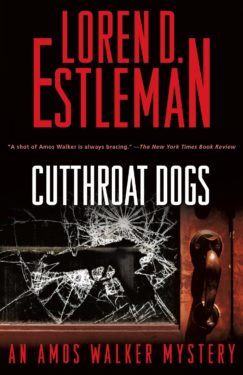 “Someone is dead who shouldn’t be, and the wrong man is in prison.”
“Someone is dead who shouldn’t be, and the wrong man is in prison.” Laguna Beach, California, 1968. The Age of Aquarius is in full swing. Timothy Leary is a rock star. LSD is God. Folks from all over are flocking to Laguna, seeking peace, love, and enlightenment.
Laguna Beach, California, 1968. The Age of Aquarius is in full swing. Timothy Leary is a rock star. LSD is God. Folks from all over are flocking to Laguna, seeking peace, love, and enlightenment. 2017: A military transport on a secret run to dispose of its deadly contents vanishes without a trace.
2017: A military transport on a secret run to dispose of its deadly contents vanishes without a trace.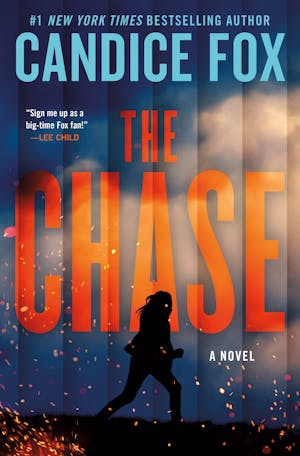
A U.S. spy plane crashes off the northern coast of Russia at the same time that a Mossad operative is abducted from a street in Kazakhstan. The two events seem unrelated, but as suspicions rise, the CIA calls in its premier operative, David Slaton.
When McGarvey’s best friend, Otto, is charged with treason, Mac and his wife, Petey, set out on a desperate odyssey to clear Otto’s name. Crossing oceans and continents, their journey will take them from Japan to the US to Pakistan to Russia. Caught in a Kremlin crossfire between two warring intel agencies, Mac and Petey must fight for their lives every step of the way.
 Cadie Kessler has spent decades trying to cover up one truth. One moment. But deep down, didn’t she always know her secret would surface?
Cadie Kessler has spent decades trying to cover up one truth. One moment. But deep down, didn’t she always know her secret would surface? Areum lives life to its fullest, vicariously through the stories of his parents, conversations with Little Grandpa Jang—his sixty-year-old neighbor and best friend—and through the books he reads to visit the places he would otherwise never see.
Areum lives life to its fullest, vicariously through the stories of his parents, conversations with Little Grandpa Jang—his sixty-year-old neighbor and best friend—and through the books he reads to visit the places he would otherwise never see. Everyone knows Lily Atwood—and that may be her biggest problem. The beloved television reporter has it all—fame, fortune, Emmys, an adorable seven-year-old daughter, and the hashtag her loving fans created: #PerfectLily. To keep it, all she has to do is protect one life-changing secret.
Everyone knows Lily Atwood—and that may be her biggest problem. The beloved television reporter has it all—fame, fortune, Emmys, an adorable seven-year-old daughter, and the hashtag her loving fans created: #PerfectLily. To keep it, all she has to do is protect one life-changing secret. Sadie Way Scott has been avoiding her family and hometown of Sugarberry Cove, Alabama, since she nearly drowned in the lake just outside her mother’s B&B. Eight years later, Sadie is the host of a much-loved show about southern cooking and family, but despite her success, she wonders why she was saved. What is she supposed to do?
Sadie Way Scott has been avoiding her family and hometown of Sugarberry Cove, Alabama, since she nearly drowned in the lake just outside her mother’s B&B. Eight years later, Sadie is the host of a much-loved show about southern cooking and family, but despite her success, she wonders why she was saved. What is she supposed to do?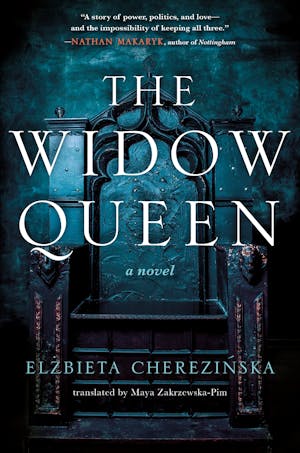 The bold one, they call her—too bold for most.
The bold one, they call her—too bold for most.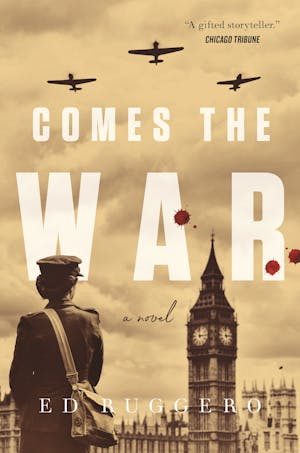 April 1944, the fifty-fifth month of the war in Europe. The entire island of Britain fairly buzzes with the coiled energy of a million men poised to leap the Channel to France, the first, riskiest step in the Allies’ long slog to the heart of Germany and the end of the war.
April 1944, the fifty-fifth month of the war in Europe. The entire island of Britain fairly buzzes with the coiled energy of a million men poised to leap the Channel to France, the first, riskiest step in the Allies’ long slog to the heart of Germany and the end of the war. Bella was once a lost dog, but now she lives happily with her people, Lucas and Olivia, only occasionally recalling the hardships in her past. Then a weekend camping trip turns into a harrowing struggle for survival when the Rocky Mountains are engulfed by the biggest wildfire in American history. The raging inferno separates Bella from her people and she is lost once more.
Bella was once a lost dog, but now she lives happily with her people, Lucas and Olivia, only occasionally recalling the hardships in her past. Then a weekend camping trip turns into a harrowing struggle for survival when the Rocky Mountains are engulfed by the biggest wildfire in American history. The raging inferno separates Bella from her people and she is lost once more.
